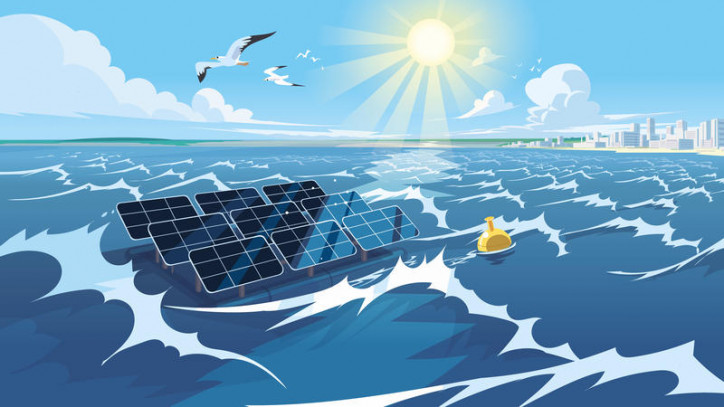A consortium of Tractebel, Jan De Nul Group, DEME, Soltech and Ghent University announced yesterday the launch of an innovative project in the field of marine floating solar technology. The partners strongly believe that solar photovoltaic (PV) panels in offshore waters are one of the essential future green energy sources. Combined in the same location with aquaculture and offshore wind power, this innovative technology allows for more efficient use of available space.

High-wave offshore solar technology as a logical step in the energy market
While solar PV technology costs are still constantly decreasing, the evolution towards high-wave offshore applications is a logical next step after fresh water floating PV on lakes and dams and low-wave offshore applications in lagoons and other sheltered environments. Factors such as land scarcity, large scale standardization and NIMBY impact are indeed expected to support the growth of the offshore solar energy market as they did for wind energy. More generally, this expansion can be seen as a step towards the further development of the Blue Economy, driving concepts such as cities on the water, offshore energy hubs, etc.
A challenging environment
Taking solar technology to a rough offshore environment needs the existing solar PV panels to be adapted to resist salty water and withstand strong currents and wave action. In addition, a cost competitive concept for the floater structure should be designed. Finally, ecosystem integration of the floating PV panels will be investigated from the start, to reduce the impact as much as possible.
A consortium with a proven track record
The consortium partners bring together all required skills and expertise to make this innovative project a success. While Tractebel has built strong engineering skills in both PV technology and offshore engineering, DEME and Jan De Nul Group are highly experienced in marine operations and involved in numerous windfarm developments and installations. Soltech is an expert in specialized solar PV panels and Ghent University is one of the leading knowledge centers in offshore engineering, aquaculture and ecosystem research.
A joint industry and government initiative
The consortium, led by Tractebel, was set up in the framework of the Flemish Blue Cluster and is strongly supported by VLAIO. For this initiative, the budget of about € 2 Mio is a result of joined forces between industry and government support. With these means, the consortium aims to develop new concepts and perform laboratory and field testing to take the first steps towards the commercialization of the technology.
A pioneering solution
The partners of the consortium are the first in Belgium to explore this pioneering offshore solar solution. Their ambition is also to be the first to realize offshore solar farms in the Belgian North Sea - eventually in combination with windfarms or aquaculture. In this way, the partners position themselves in this new, fast-evolving market.
Philippe Hutse, Offshore Director at Jan De Nul Group: “We are proud to be part of this research programme and pioneering solution. Jan De Nul strongly believes in offshore renewables and is keen to explore alternative solutions such as Floating Solar PV as part of the future offshore energy mix. Therefore we wish to join forces with industry and government to accelerate this sustainable solution.”
Denis Lohest, CEO of Tractebel in Belgium: “This groundbreaking initiative perfectly fits Tractebel’s ambition to become a world leader in offshore engineering for energy production, storage and transport. Following our active involvement in one of the world’s first floating wind farms, it is a great honor for us to team up with key energy players for the development of first-of-its-kind technology for high-wave offshore solar panels.”
Luc Vandenbulcke, CEO of DEME: “At DEME we are confident that high wave offshore solar technology can play a key role in realising a sustainable energy transition. With our know-how, high-tech equipment and innovative solutions, we have always been a pioneer in the renewable energy market and look forward to working with our consortium partners to develop and install the world’s first high wave offshore solar farm in Belgium.”
Stefan Dewallef, Product Development Manager at Soltech: “Soltech is looking forward to the challenge of developing marine-suitable PV panels that can withstand harsh offshore conditions.”
Dr. ir. Margriet Drouillon, Senior Business Developer at Ghent University: “This multidisciplinary project fits perfectly within Ghent University’s strong efforts to expand its Research & Development in marine / maritime sciences and Blue Growth in general. With the Laboratory of Aquaculture, the Environmental Toxicology Unit and the Maritime Technology Division, we have three expert research groups in their field participating in the project.”
Source: Jan De Nul